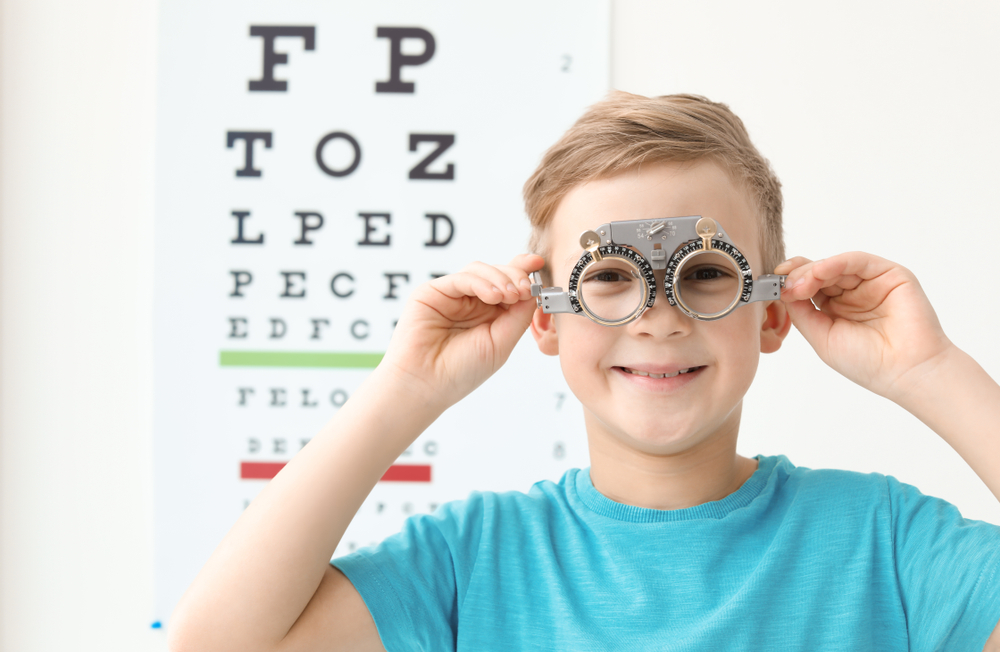Myopia is a refractive error that affects a significant portion of the population, particularly children. As the world becomes increasingly reliant on digital devices and near-work activities, the prevalence of myopia in young individuals continues to rise. This condition occurs when the eye elongates excessively, causing light rays to focus in front of the retina rather than directly on it, resulting in blurred distance vision.
Causes of Myopia in Children
Several factors contribute to the development of myopia in children, including:
- Genetics: Myopia has a strong hereditary component. If one or both parents are myopic, the child has a higher risk of developing the condition.
- Environmental Factors: Prolonged near-work activities, such as reading, using digital devices, and studying, can strain the eyes and contribute to myopic progression. Additionally, limited time spent outdoors has been linked to an increased risk of myopia.
Symptoms of Myopia in Children
Children with myopia may exhibit the following symptoms:
- Squinting or frowning when trying to see distant objects
- Sitting closer to the TV or holding reading materials closer to their face
- Frequent eye rubbing or complaints of headaches or eye strain
- Poor performance in sports or activities that require good distance vision
If you notice any of these signs in your child, it's essential to schedule an eye examination with an experienced optometrist.
The Importance of Myopia Management
Myopia management is crucial for several reasons:
- Vision Quality: Untreated myopia can lead to blurred distance vision, which can impact a child's ability to learn, participate in sports, and engage in daily activities.
- Eye Health: High levels of myopia increase the risk of developing potentially sight-threatening conditions later in life, such as myopic maculopathy, retinal detachment, and glaucoma.
- Quality of Life: Myopia can affect a child's confidence, self-esteem, and overall well-being, especially if it interferes with their ability to participate in activities or interact with their peers.
Strategies for Slowing Down Myopia Progression
While myopia cannot be cured, various strategies can be employed to slow down its progression and potentially reduce the risk of associated complications. These include:
- Atropine Eye Drops: Low-dose atropine eye drops have been shown to effectively slow myopia progression in children by temporarily relaxing the focusing muscles in the eye.
- Orthokeratology (Ortho-K): This treatment involves wearing specially designed rigid gas-permeable contact lenses overnight to temporarily reshape the cornea, reducing the need for corrective lenses during the day.
- Multifocal Contact Lenses or Spectacles: These lenses provide clear distance and near vision while also introducing a peripheral defocus, which can help slow myopia progression.
- Increased Outdoor Time: Encouraging children to spend more time outdoors has been associated with a reduced risk of myopia development and progression.
The Role of MiSight Contact Lenses in Myopia Management
Among the various myopia management strategies, MiSight contact lenses have emerged as an effective and convenient option for children. These specially designed soft contact lenses incorporate ActivControl Technology, which creates a myopia-controlling defocus on the peripheral retina while providing clear central vision.
MiSight contact lenses offer several advantages for children with myopia:
- Slowed Progression: Clinical studies have shown that MiSight contact lenses can slow myopia progression by up to 59% over three years compared to traditional corrective lenses.
- Convenience: Unlike other myopia management methods, MiSight contact lenses provide a simple and easy-to-use solution that can be worn during the day, eliminating the need for additional treatments or overnight wear.
- Improved Vision Quality: By correcting refractive errors, MiSight contact lenses provide clear and comfortable vision for children, enhancing their ability to engage in daily activities and sports.
- Increased Confidence: Wearing contact lenses can boost a child's self-esteem and confidence, particularly in social situations or during physical activities.
- Customizable Treatment: MiSight contact lenses can be tailored to each child's specific refractive needs, ensuring optimal vision correction and myopia management.
Central DuPage Vision Center: Your Partner in Myopia Management
At Central DuPage Vision Center, we understand the importance of proactive myopia management for children. Our experienced optometrists are dedicated to providing comprehensive eye care and personalized treatment plans to help slow myopia progression and protect your child's long-term eye health.
If you're concerned about your child's myopia or interested in exploring myopia management options, schedule an appointment with Central DuPage Vision Center today. Our experts will conduct a thorough eye examination and provide personalized guidance to help preserve your child's vision and prevent potential complications associated with myopia progression. Visit our office in Winfield, Illinois, or call (630) 349-4948 to book an appointment today.
